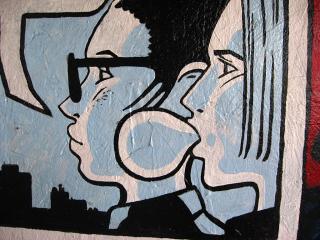The twenty-two stories in Jim Shepard’s Love and Hydrogen cover a lot of ground: from gay love aboard the Hindenburg to Dutch soccer to a first-person narrative written by the Creature from the Black Lagoon. While a common style and repeated themes connect the collection, a great deal of effort is demonstrated in creating a rich scenario for each. I appreciated the degree to which each story felt like an initiation into a new area of knowledge, while also feeling united by a kind of unfathomable emotional edge – intentionally vague and melancholic.
Shepard clearly likes disasters, dysfunctional families, aviation, and monster-style early science fiction. The prevalence of the latter theme makes the book feel older than it is: as though it was written in the age of drive-in movies rather than as a response to it, about five decades later. The whole collection has strong overtones of post-war America, though with violence as a near-constant theme.
The sports stories elicited much the same reaction in me as the sports themselves: soccer interesting, football brutal, and baseball hokey with an American twang. Among the aviation stories, the one describing the experience of German trainee pilots with the infamous Messerschmitt Me 163 “Komet” was perhaps the most compelling. I can see why the vehicle appealed to Shepard; as the first rocket-powered manned fighter, with corrosive fuel and no landing gear, it was an incredibly perilous thing to fly. That particular story resonated nicely with the recently completed Why the Allies Won, both touching upon the theme of Germany pushing technology forward, but often doing so in ways that were not tactically or strategically useful.
Shepard has a talent for simple yet powerful statements. In a story about the first bathysphere, the narrator notes calmly that he “passed the point below which only dead men had sunk.” In a story written from the perspective of John Entwistle, the bass player in The Who, the narrator remarks that: “Rage in the service of self-pity was what we’d always been about. It was what rock had always been about.” Similar elegant tidbits are sprinkled through the volume – counterpointing descriptive passages that sometimes come off as an evocative but elusive tangle of words. I found myself getting particularly lost in some of the dysfunctional family narratives – most of my mind warning that “this isn’t something we want to wander into.”
Having the daring to write the supposed thoughts of contemporary figures is an impressive if somewhat off-putting characteristic. “John Ashcroft: More Important Things than Me” is probably the most elusive story in the collection. It is written as a collection of aphorisms, focusing on Ashcroft’s personal convictions and life experiences. I don’t know to what extent it faithfully reproduces the life or views of the controversial figure, but – as a story – it remains quite opaque in its motivations. In a sense, it is a humanizing text, seemingly contributing to a more balanced understanding of the public figure. At the same time, it leaves the reader suspicious: both the supposed author (Ashcroft himself) and the actual author are presumably trying to forward a political agenda or perpetuate some sort of satire or criticism. As it stands, it remains unclear what either message is meant to be.
Overall, the collection is the kind of literary work where you are constantly thinking “I will understand this better the second time around.” Given the quality of the stories, it is plausible that this will be one of the few books that actually earns a second reading.


See:
2007-2008 Emily Horn and Milan Ilnyckyj book project
Baseball is hokey?
You had better hope you are never standing for elected office in America, son.
I appreciated the degree to which each story felt like an initiation into a new area of knowledge, while also feeling united by a kind of unfathomable emotional edge – intentionally vague and melancholic. It is difficult to find a contemporary collection of short stories that delves into so many different spheres: different times, situations, and locations. I found it remarkable, and telling of the immensity of his talent, that you can find yourself on the Hindenberg with two gay lovers, and fast forward to a sympathetic rendering of the life of a swamp man a few pages ahead.
He brings a deeply human feel to every scene, and I find that it is easy to step out of one story in one time-space directly into another because he creates a keen verisimilitude of reality that makes it easy to step into pace with. His text is natural, and informed, and intelligent. His observations (as you mentioned) are very apt.
I’m glad you enjoyed it. He is a very inspiring writer for me.